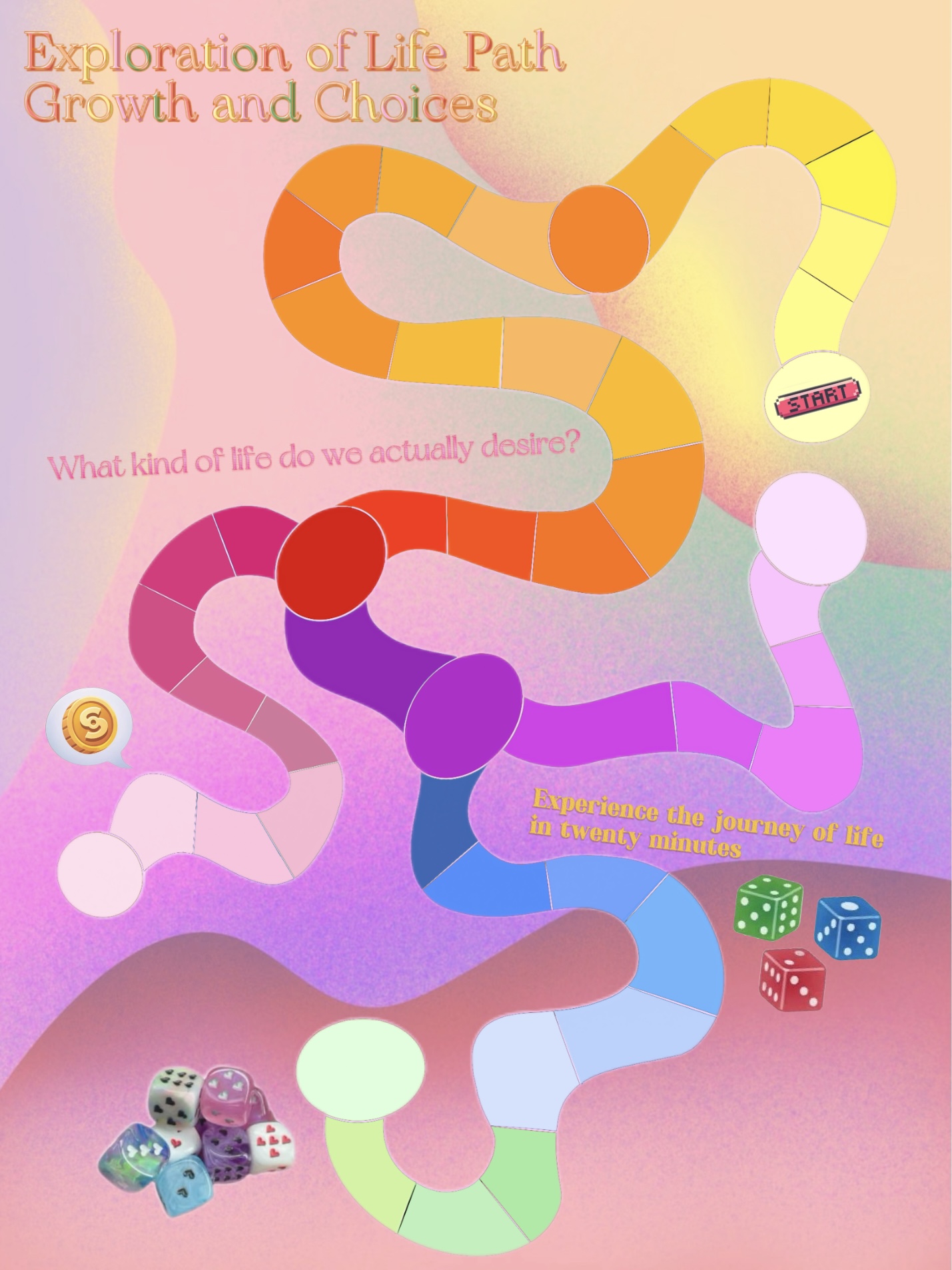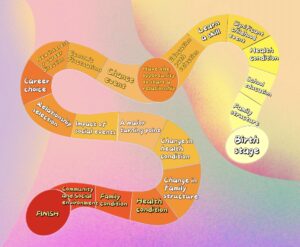Exploration Of Life Path: Growth And Choices

Summary
This is an interactive experience toolkit that combines narrative, choices and randomness,from birth to old age, you will draw different types of cards, make choices, encounter changes, and within twenty minutes, create a condensed life story that you have personally constructed and driven by fate.
Introduction🎮
This toolkit is an experiential life simulation game centered around narrative, card drawing, and choices. The learners will draw cards representing family, education, health, career and social relationships at different stages of their lives. It enables learners to experience a complete life cycle from birth to old age within twenty minutes. Through the interweaving of random events and autonomous choices, learners can explore the contingency of fate and the power of choices.
This is an open toolkit🌟
The life events depicted in the grid and the events that can be drawn from the cards are not fixed. I encourage each learner to adjust and modify them according to their own experiences and the culture of their own country, creating a life game that can inspire and be educational. I believe that if more diverse cultures and richer experiences are integrated, this toolkit will become more complete and meaningful.
Material preparation🎨
A pen
One or two blank sheets, about A5 size
The snake-shaped grid image for step 3 can be downloaded and printed, or saved as an electronic version. This will be convenient for the subsequent game process.
You can also download the blank version to fill in the events yourself, or draw the chessboard grid based on the template to play the game.
All the cards needed for Step 3 can be printed and cut out by the learners before the game starts, and then they can be classified.
And some blank cards, where learners can fill in the contents themselves to play the game.
Are you ready? Let’s start!
Step 1:Think about life (2 minutes)🧠
Divide life into five stages: childhood、youth,、adulthood,middle age and old age. What events will occur in each of these stages? Take two minutes to think about it. If you had experienced completely different events from the ones you have now, how would your life direction be? You can simply make a note on a piece of white paper.
Step 2 : Read the game rules (3 minutes)💡
-
In the order of life stages:Birth → Childhood → Youth → Adulthood → Middle Age → Old Age
-
Each step involves drawing cards or making a choice according to the instructions.
-
After each card draw, reflection and recording should be conducted. At the end of each stage, key words and key events should be recorded.
Step 3 : Start experiencing life (10 minutes)

A game map depicting the life path from birth to old age. Each square in the map represents a key event or life choice, such as family, education, career, health and social relationships, and is used in the teaching activities of this experiential life simulation toolkit.
Birth stage 🟨
0.Birth background
-
Draw one card from the eight cards of birth background.
-
Record key information such as the birth environment and family conditions.
- Birth background card
The childhood period🟦
1.Family structure
-
Draw one card from the six family cards from childhood.
-
Think about and document the influence of your early upbringing environment.
- Family card(childhood)
2.School education
-
If your birth background is listed as “conflict zone” or “rural community” , then you can only choose not to receive education or to receive informal education.
-
Think about and record the events that occurred during the educational stage.
- Education card(childhood)
3.Health condition
-
Draw one card from the five health cards from childhood.
-
Think about and record your health condition
- Health cards(childhood)
4.Significant childhood events
-
Draw one card from the six cards depicting random events from childhood.
-
Record and reflect on the potential impact of this matter.
- Random event card(childhood)
5.Learn a skill
-
Choose a skill freely, write down its name, and record its possible impacts.
End of childhood stage: Write down the key words and key events of childhood.
Youth stage🟩
6. Educational Path Selection
-
If you choose to continue your studies, then one of the four education cards from your youth will be drawn.
-
If you choose to work, then select one from the career cards.
-
The youth who were born in conflict areas or rural area have the option to either attend part-time school and work simultaneously or to directly enter the workforce at this time and draw a career card.
-
Record your choices and their outcomes.
- Education card(youth)
- career card(youth)
7.Have the opportunity to start a relationship
-
Draw one of the two cards representing the relationship during youth.
-
Record the results and reflect on this impact.
- Relationship card(youth)
8.Chance event
-
Draw one card from the four random event cards(Social Relationship Category).
-
Record the results and reflect on this impact.
- Random event card(Social Relationship Category)
9.Economic fluctuations
-
If the previous choice was to continue studying, then no card draw will occur.
-
If you choose to work, then draw one card from the four random event cards (related to economics).
-
Record the results and reflect on this impact.
- Random event card (related to economics)
10.New interests or career directions
-
Choose an interest or direction on your own and record it.
The end of the youth stage: Write down the central problems of your youth and record the key words and key events.
Adulthood stage🟧
11.Career choice
-
If you are in the state of “unemployment” or “continuing your education”, then draw one card from the eleven career cards.
-
If you already have a profession, then no card draw will be performed.
-
Record the results and reflect on this impact.
- Career card(adulthood)(These career cards do not represent all the careers. They merely cover some of the more common ones. When you use the toolkit, you can add or modify the careers.)
12.Relationship selection
-
Based on your personal preferences, choose one of the following options:
Establish a long-term relationship
Stay single
Form a family
-
Record the results and reflect on this impact.
13.Impact of social events
-
Draw one card from the four cards representing random events in adulthood(Social Event Category).
-
Record the results and reflect on this impact.
- Random event card(Social Event Category)
14.A major turning point
-
Draw one card from the four major random events cards.
-
Record the results and reflect on this impact.
- Random event card(adulthood)
End of the adult stage: Write down the key words and key events.
Middle age stage🟥
15.Change in health condition
-
Draw one card from the five health cards of middle-aged people.
-
Record the results and reflect on this impact.
- Health card(middle age)
16.Changes in family structure
-
If one chooses to form a family during adulthood, then one will draw one of the four family cards.
-
If not formed, no cards will be drawn.
-
Record the results and reflect on this impact.
- Family card(middle age)
End of the middle age stage: Write down the key words and key events.
The elderly stage⬜
17.Health condition
-
Draw one card from the three health cards of the elderly.
-
Record the results and reflect on this impact.
- Health card(elderly age)
18.Family condition
-
Draw one card from the four family cards of the elderly period.
-
Record the results and reflect on this impact.
- Family card(elderly age)
19.Community and Social Environment
-
Draw one card from the three community environment cards.
-
Record the results and reflect on this impact.
- Community environment card(elderly card)
Step 4 : Looking back and reflecting🪞(5 minutes)
-
After the game is over, go back to the paper and take a look at your “life trajectory” Think about which part was the most unexpected for you, and which part is the most similar to your actual life?
-
Reflecting on this life, does it make you have a deeper understanding of yourself in reality?
-
Think about which crucial moments in life are determined by structures?
(For example: birth background, family structure, educational resources, economic fluctuations, social events) -
Which events are beyond your control?(For example: health condition, major social events, family changes)
-
How do these structural factors guide or restrict your life choices?
-
Reflecting on this life, does it make you have a deeper understanding of yourself in reality?
-
If it is a multiplayer game, share your insights gained during the game with each other, and also discuss the different choices made.
Reference
Abbott, Daisy. “Modding Tabletop Games for Education.” Lecture Notes in Computer Science, 318–29. Cham: Springer International Publishing, 2019.
Betts, Ben. “Game‐Based Learning.” 175–94. Hoboken, NJ, USA: John Wiley & Sons, Inc, 2012.
Geroimenko, Vladimir. Augmented Reality Games, the Gamification of Education, Medicine and Art. 1st ed.
Birth background card © 2025 by Siyi Wang is licensed under CC BY-NC-SA 4.0. To view a copy of this license, visit https://creativecommons.org/licenses/by-nc-sa/4.0/
Family card(childhood) © 2025 by Siyi Wang is licensed under CC BY-NC-SA 4.0. To view a copy of this license, visit https://creativecommons.org/licenses/by-nc-sa/4.0/
Education card(childhood) © 2025 by Siyi Wang is licensed under CC BY-NC-SA 4.0. To view a copy of this license, visit https://creativecommons.org/licenses/by-nc-sa/4.0/
Health cards(childhood) © 2025 by Siyi Wang is licensed under CC BY-NC-SA 4.0. To view a copy of this license, visit https://creativecommons.org/licenses/by-nc-sa/4.0/
Random event card(childhood) © 2025 by Siyi Wang is licensed under CC BY-NC-SA 4.0. To view a copy of this license, visit https://creativecommons.org/licenses/by-nc-sa/4.0/
Education card(youth) © 2025 by Siyi Wang is licensed under CC BY-NC-SA 4.0. To view a copy of this license, visit https://creativecommons.org/licenses/by-nc-sa/4.0/
career card(youth) © 2025 by Siyi Wang is licensed under CC BY-NC-SA 4.0. To view a copy of this license, visit https://creativecommons.org/licenses/by-nc-sa/4.0
Relationship card(youth) © 2025 by Siyi Wang is licensed under CC BY-NC-SA 4.0. To view a copy of this license, visit https://creativecommons.org/licenses/by-nc-sa/4.0/
Random event card(Social Relationship Category) © 2025 by Siyi Wang is licensed under CC BY-NC-SA 4.0. To view a copy of this license, visit https://creativecommons.org/licenses/by-nc-sa/4.0/
Random event card (related to economics) © 2025 by Siyi Wang is licensed under CC BY-NC-SA 4.0. To view a copy of this license, visit https://creativecommons.org/licenses/by-nc-sa/4.0/
Career card(adulthood) © 2025 by Siyi Wang is licensed under CC BY-NC-SA 4.0. To view a copy of this license, visit https://creativecommons.org/licenses/by-nc-sa/4.0/
Random event card(Social Event Category) © 2025 by Siyi Wang is licensed under CC BY-NC-SA 4.0. To view a copy of this license, visit https://creativecommons.org/licenses/by-nc-sa/4.0/
Random event card(adulthood) © 2025 by Siyi Wang is licensed under CC BY-NC-SA 4.0. To view a copy of this license, visit https://creativecommons.org/licenses/by-nc-sa/4.0/
(Exploration Of Life Path: Growth And Choices © 2025 by Siyi Wang is licensed under CC BY-NC-SA 4.0)


